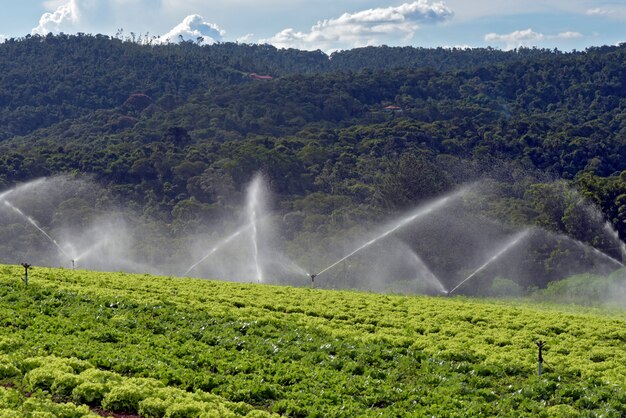Water is a vital resource for any farm, and managing it effectively is crucial for maintaining healthy crops and livestock. In South Africa, where water scarcity can be a significant challenge, efficient irrigation systems have become indispensable for farmers seeking to optimize water use and enhance productivity. Among the key components of any irrigation system are irrigation pumps, which play a critical role in ensuring a reliable and consistent water supply for your farm. This article explores the role of irrigation pumps in maintaining water supply and how they contribute to sustainable farming practices.
1. Understanding Irrigation Pumps and Their Function
Irrigation pumps are mechanical devices that move water from a source (such as a river, dam, well, or reservoir) to your fields, orchards, or livestock watering stations. These pumps are designed to pressurize and transport water through an irrigation system, ensuring that crops receive the right amount of water at the right time.
There are different types of irrigation pumps, including centrifugal pumps, diaphragm pumps, and piston pumps, each suited for different irrigation needs. The pump you choose will depend on factors such as the water source, the size of your farm, the type of irrigation system (e.g., drip, sprinkler, or furrow irrigation), and the required flow rate.
2. Providing Consistent and Reliable Water Supply
One of the primary roles of irrigation pumps is to provide a consistent and reliable water supply. Natural rainfall alone is often insufficient for optimal crop growth, particularly in areas that experience irregular or insufficient rainfall patterns. In regions like South Africa, where droughts are a recurring issue, irrigation systems ensure that crops receive adequate water, even during dry periods.
- Efficiency in Water Distribution: Irrigation pumps help distribute water uniformly across the field, ensuring that each plant receives the appropriate amount of water for growth. Without pumps, farmers would have to rely on manual watering methods, which are not only time-consuming but also less efficient.
- On-Demand Watering: Pumps allow farmers to irrigate their crops at specific times, reducing the risk of overwatering or underwatering. This on-demand watering helps conserve water while ensuring that plants thrive.
3. Enabling Efficient Water Use
In water-scarce regions, like many areas in South Africa, efficient water use is essential. Irrigation pumps help farmers make the most of their available water resources by enabling more precise control over how much water is applied and where it goes. This is particularly important in minimizing water waste and maximizing crop yield.
- Drip Irrigation Systems: One of the most water-efficient irrigation methods is drip irrigation, which delivers water directly to the roots of plants, minimizing evaporation and runoff. Irrigation pumps are essential in pressurizing and moving water through the system to ensure that it reaches the plants at the right flow rate.
- Sprinkler Systems: Sprinklers can cover large areas, providing uniform water distribution across crops. The pump pressurizes the water, ensuring that it is evenly distributed, even if the irrigation system is extensive.
By using irrigation pumps with advanced systems like drip or sprinkler irrigation, farmers can significantly reduce water waste and improve crop water productivity.
4. Supporting Crop Health and Yield
Adequate irrigation is crucial for the health of your crops. Both overwatering and underwatering can stress plants and lead to poor growth, reduced yield, or even crop failure. Irrigation pumps help farmers maintain the ideal water levels for crop growth, promoting better health and higher yields.
- Preventing Crop Stress: Consistent watering from an efficient irrigation pump prevents plants from experiencing stress due to fluctuating water supply. This is particularly important during dry spells when crops are at risk of dehydration.
- Improved Root Development: Proper irrigation encourages deep root growth, allowing plants to access water and nutrients from deeper layers of the soil. This results in stronger, healthier plants that are better able to withstand extreme weather conditions.
By ensuring that crops receive the necessary amount of water at the right times, irrigation pumps directly contribute to enhanced crop performance and increased agricultural productivity.
5. Reducing Labor Costs
Irrigation systems powered by pumps also help reduce the labor costs associated with manual watering methods. While traditional irrigation techniques like flood or furrow irrigation require significant labor input, irrigation pumps automate much of the process, freeing up time for farmers to focus on other tasks.
- Automation of Irrigation: With modern irrigation pumps, farmers can automate the irrigation process using timers or soil moisture sensors. This reduces the need for constant monitoring and manual intervention.
- Labor Efficiency: By using pumps, farmers can irrigate large areas more quickly and efficiently, reducing the need for numerous workers and lowering labor costs.
For farmers looking to streamline operations and cut costs, investing in an irrigation pump system is a worthwhile consideration.
6. Adapting to Changing Environmental Conditions
As climate change brings more unpredictability to weather patterns, having a reliable water supply is more important than ever. Irrigation pumps provide farmers with the flexibility to adapt to changing environmental conditions, such as prolonged dry spells or unpredictable rainfall patterns. This adaptability ensures that crops continue to receive adequate water, even when natural water resources are scarce.
- Drought Resilience: In times of drought, an irrigation pump system ensures that farmers can continue to irrigate their crops without relying solely on rainfall.
- Flood Control: Conversely, during periods of heavy rainfall, irrigation pumps can help drain excess water, preventing waterlogging and ensuring that crops aren’t damaged by too much water.
By investing in the right irrigation pump, farmers can improve their resilience to climate variability and ensure the sustainability of their farming operations.
7. Choosing the Right Irrigation Pump for Your Farm
Selecting the right irrigation pump is critical for achieving efficient water use and maintaining crop health. Several factors need to be considered when choosing an irrigation pump:
- Water Source: The type of water source (e.g., borehole, river, or dam) will determine the type of pump required. For example, a submersible pump is ideal for wells or boreholes, while a surface pump is better suited for rivers or reservoirs.
- Flow Rate and Pressure: Different irrigation systems require different flow rates and pressures. Ensure that the pump you select can handle the specific needs of your irrigation system, whether it’s drip, sprinkler, or another method.
- Energy Source: Consider the energy requirements of the pump. Electric, diesel, and solar-powered pumps are the most common options, and each has its advantages depending on the available power supply and the scale of your farm.
Consult with experts or irrigation system suppliers to help you choose the most suitable pump for your farm’s specific needs.
Irrigation pumps are a cornerstone of modern farming, helping farmers in South Africa and beyond manage water resources more efficiently. They ensure a reliable water supply, improve crop health, reduce labor costs, and contribute to the overall sustainability of farming operations. With the right irrigation pump and system in place, farmers can enhance their productivity, adapt to changing environmental conditions, and contribute to more sustainable agricultural practices. Investing in high-quality irrigation pumps is not just an investment in your crops, but in the long-term success and sustainability of your farm.
Join 'Farmers Mag' WhatsApp Channel
Get the latest Farming news and tips delivered straight to your WhatsApp
CLICK HERE TO JOIN






